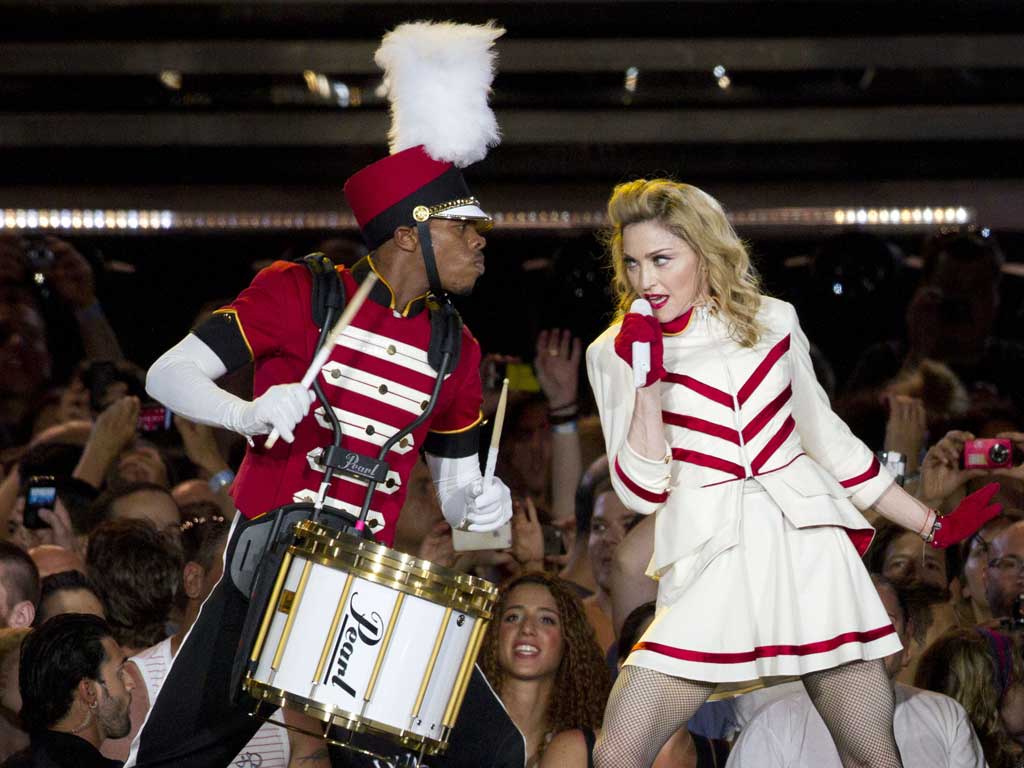Israel is new South Africa as boycott calls increase
After Madonna began her world tour there last week, campaigners urge cutting of cultural ties

Your support helps us to tell the story
From reproductive rights to climate change to Big Tech, The Independent is on the ground when the story is developing. Whether it's investigating the financials of Elon Musk's pro-Trump PAC or producing our latest documentary, 'The A Word', which shines a light on the American women fighting for reproductive rights, we know how important it is to parse out the facts from the messaging.
At such a critical moment in US history, we need reporters on the ground. Your donation allows us to keep sending journalists to speak to both sides of the story.
The Independent is trusted by Americans across the entire political spectrum. And unlike many other quality news outlets, we choose not to lock Americans out of our reporting and analysis with paywalls. We believe quality journalism should be available to everyone, paid for by those who can afford it.
Your support makes all the difference.Some of the world's biggest stars – from Madonna to the Red Hot Chili Peppers – are being accused of putting profit before principle in a growing backlash against artists performing in Israel.
Campaigners angry at human rights abuses against the Palestinian people – symbolised by Israel's policy of demolishing the homes of Palestinians and allowing Israeli settlers to take over their land – are demanding a boycott of Israeli venues in a campaign that echoes the 1980s protests against South Africa and the infamous venue Sun City.
Last week Madonna came under fire for her decision to perform in Israel to kick off her world tour last Thursday. "By performing in Israel, Madonna has consciously and shamefully lent her name to fig-leafing Israel's occupation and apartheid and showed her obliviousness to human rights," said Omar Barghouti of the Palestinian Campaign for the Academic and Cultural Boycott of Israel.
Attempts by Madonna to deflect criticism by offering free tickets to local campaigners backfired, with a number rejecting the offer. Boycott from Within, an Israeli campaign group, accused the singer of "a blatant attempt at whitewashing Israeli crimes". Mr Barghouti added: "As we've learned from the South African struggle for freedom, entertaining Israeli apartheid should never be mislabelled as singing for peace." The star's publicist did not respond to requests for comment.
Acts such as alleged war crimes during Israel's 2008 invasion of Gaza and the 2010 killing of peace activists by Israeli commandos on an aid ship are fuelling the return of an anti-apartheid campaign on a scale not seen in a generation. Saeed Amireh, 21, a peace activist from Nilin in the West Bank, said: "We don't have freedom of movement. They don't want peace; they just want us to disappear. They are suppressing our very existence."
Calls for a boycott are supported by hundreds of artists around the world, from the film director Ken Loach to former Pink Floyd frontman Roger Waters and the author Alice Walker. Artists such as Carlos Santana and Elvis Costello have cancelled shows after pressure from campaigners in recent years; Coldplay, U2 and Bruce Springsteen have declined invitations to play in Israel without supporting the boycott publicly. Paul McCartney, Elton John, Rihanna and Leonard Cohen are among those to have ignored calls not to appear there.
The Red Hot Chili Peppers, Lenny Kravitz and Guns N' Roses plan to play in Israel this year, prompting the campaign group Artists Against Apartheid to appeal: "As was done in the case of South African apartheid, please join us now in the cultural boycott of Israel, and help stop entertaining apartheid." The campaign has rattled the music industry, prompting a group of US-Israel entertainment executives to set up the Creative Community for Peace last year in an effort to counter the cultural boycott.
It is also troubling senior Israeli politicians: a law passed by the Knesset last year means that people who call for a boycott could be sued in court. The Israeli government has also set up a committee to look at how to compensate Israeli promoters in the cases of "politically motivated cancellations".
Controversy over Israel's treatment of Palestinians has provoked protests among actors, too. Emma Thompson is among more than 30 actors, directors and playwrights who condemned the Globe Theatre for including Israel's national theatre company in its Shakespeare festival last week.
The Israeli embassy this weekend dismissed criticisms of Israel as "an anti-Israeli movement" and the Board of Deputies of British Jews claimed comparisons with apartheid-era South Africa were "a specious and desperate effort by a failing boycott campaign". Nevertheless, Israel's President Shimon Peres admitted earlier this year: "If Israel's image gets worse, it will begin to suffer boycotts. There is already an artistic boycott against us and signs of an undeclared financial boycott are beginning to emerge."
The Co-op announced a boycott of goods from West Bank settlements last month.
Join our commenting forum
Join thought-provoking conversations, follow other Independent readers and see their replies
Comments